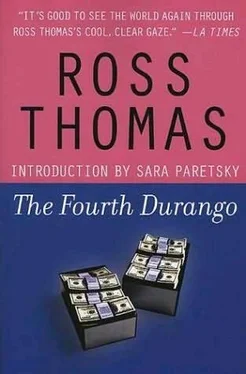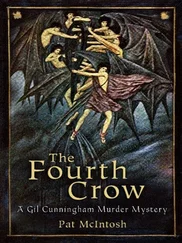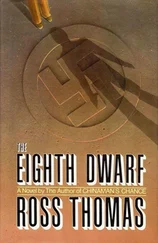“She didn’t want anybody.”
Huckins turned from the slice of “On the Seine at Bennecourt,” her face composed, eyes almost dry, voice steady. “I’ll call her. See if she’d like to stay here a few days.”
The mayor moved to the rear of the leather chair and leaned her thighs against its low back, as if she found the support reassuring. Folding her arms across her chest, she said, “What message?”
Vines took the five-by-seven-inch manila envelope from his hip pocket, crossed the room and handed it to Huckins. “It’s addressed to you,” he said, “but it concerns all four of us.”
“I see you opened it,” the mayor said, her tone making it clear she didn’t like anyone opening her mail. She removed the photographs and examined them quickly. When she began to go through them more slowly, Jack Adair asked, “Who’re Norm and Virginia?”
“Virginia’s the wife of Norm Trice,” she said, putting the photographs back in the envelope. “He owned the Blue Eagle Bar and some other property around town. He was also my earliest backer.” She looked at Adair. “Financial backer.”
Adair used a sympathetic headshake to demonstrate how fully he appreciated the mayor’s loss. She walked around the leather chair to hand him the envelope. “I’ll miss Norm,” she said.
“I can imagine,” said Adair as he removed the photographs and went through them slowly. When he finished he looked up at Vines. “You hid and I stuck out my tongue.”
“The chief thinks it’s a metaphor.”
Fork shook his head. “You said that, not me.”
Adair looked at B. D. Huckins, who had moved over to a window and was staring out at the night. “Where and when did they take this one of you and the chief?” he asked.
Without turning, she said, “Just after six in the evening two days ago in the parking lot behind City Hall.”
Adair looked at Fork for confirmation. The chief tugged at an earlobe, frowned and said, “By God, that’s right.”
B. D. Huckins turned from the window to look at Adair. “Sid and I were talking-maybe even arguing-about whether to have a drink. We didn’t. Have a drink, I mean.”
“You didn’t notice the photographer either,” Vines said.
The mayor shook her head. “Those pictures of you two. Where were they taken?”
“Downtown Lompoc,” Vines said. “Less than an hour after Jack got out of jail.”
She looked at Fork. “I’d like a drink, Sid. Some brandy.”
“Anybody else?” Fork asked. Vines said he’d like a beer and Adair said he’d finish what he had. After Fork left for the kitchen, the mayor sat back down in her favorite chair, tucked both feet up beneath her and smoothed the black skirt down over her knees.
No one said anything until Fork returned with two beers and the brandy. He served Huckins, handed Vines an open bottle and asked if he needed a glass. Vines said he didn’t.
After she tasted her brandy, B. D. Huckins asked the room at large, “What could be the point of killing Norm?”
“To make sure we understand the message,” Vines said.
“Which is what-in plain English?”
“That’s easy,” Fork said, taking the only other chair in the room, which was really more stool than chair. “They used those photos to tell us they know all about how you and I’re going to supply the judge and Vines here with a hideout. Then they killed poor old Norm to tell us they’re the worst kind of folks to fuck with.” He looked at Vines. “That about it?”
“Just about.”
In the silence that followed, Jack Adair leaned back on the couch’s cushions and examined the ceiling. Finally, he said, “I wonder how they discovered the connection between you and us so quickly.”
After another, briefer silence, B. D. Huckins said, “Somebody talked.”
“I told no one,” Adair said. “And Kelly spoke only to Soldier Sloan.”
“Then he talked to one person too many,” she said.
“Who’d you tell?” Vines asked her. “Other than your sister?”
“Nobody.”
Vines and Adair looked at Sid Fork, who said he hadn’t told anyone either.
Adair returned his gaze to the mayor. “And who would your sister tell?”
“Her husband,” Fork said before the mayor could say anything.
“I hope she did,” B. D. Huckins said, indifferent to the three bleak stares she drew. When she spoke again, it was to Jack Adair. She leaned forward a little and stared at him with cool gray eyes that-Adair later swore to Vines-“peeped right down into the basement of my soul where it’s all dark and dirty and crawling with bugs.”
“Understand this,” she said. “If I’m to negotiate with these people-whoever they are-I’ll need an intermediary. A go-between.”
“Makes sense,” Adair said.
“And a rich go-between’s far better than a poor one because a rich one won’t be nearly so tempted to cross us, if the occasion presents itself-which, in this case, it sure as hell will. And God knows Parvis is rich enough.”
“Parvis your brother-in-law?” Adair asked.
“Yes.”
“Thought you said his name was Mansur.”
“Parvis Mansur.”
“When do Kelly and I get to meet him?”
“What about tomorrow?”
“Are you talking about Saturday or Sunday?”
“Saturday. Today.”
“Today’d be fine,” said Jack Adair.
Although the name chiseled into the polished granite slab above the entrance read,“Durango Civic Center,” no one ever called it anything except City Hall. Built on the site of the old City Hall, which went up in 1887 and fell down in 1935 during the earthquake, the new City Hall had been completed with WPA money in June of 1938, its golden anniversary now slipping by ignored and unremarked.
It was a solid-looking three-story granite building that B. D. Huckins liked to describe as a gray footlocker with windows. Including its parking lot and Fire Engine Co. No. 1 (there was no Engine Co. No. 2), the Civic Center took up nearly half a block of prime real estate on Noble’s Trace.
The Trace, as everyone called it, was the only thoroughfare in Durango that resembled a boulevard and the only one that curved, twisted and wandered through the city from its eastern limits to the Southern Pacific tracks on the west. All other streets-except those up in the foothills-ran straight as a stripe from east to west and north to south.
Noble’s Trace took its name from a Louisiana gambler called Noble Clark, who, with his Mexican prostitute wife, Lupe, had founded the settlement 148 years ago, naming it Durango after the one in Mexico from which Lupe had fled during the 1835 plague of scorpions.
With the reluctant and lackadaisical help of some Chumash Indians, the couple built the first structure in Durango to have four walls and a roof. It was a half-timber, half-adobe building that contained a combination trading post, tavern and bawdy house. It burned to the ground under mysterious circumstances twenty-three months later, roasting to death both Noble and Lupe Clark and two unidentified male customers.
The old trail that had wound through the mountains, the foothills and down to the ocean was still called the Trace because no one had ever thought there was any real need to name it anything else.
As its chiseled-in-stone name asserted, the Civic Center was home to all of Durango’s municipal services. The mayor, the chief of police and the city treasurer were all up on the third floor along with the treasurer’s hive of bookkeepers. On the second floor were the courtroom and the chambers of the city’s municipal judge who was elected every four years. Down the hall from him were the elected city attorney and his two appointed deputies-plus two clerks, a bailiff, three secretaries and the aging part-time court reporter and full-time gay activist who, although growing deaf, was still too vain to wear a hearing aid. The fire chief worked out of his office in Fire Engine Co. No. 1.
Читать дальше












